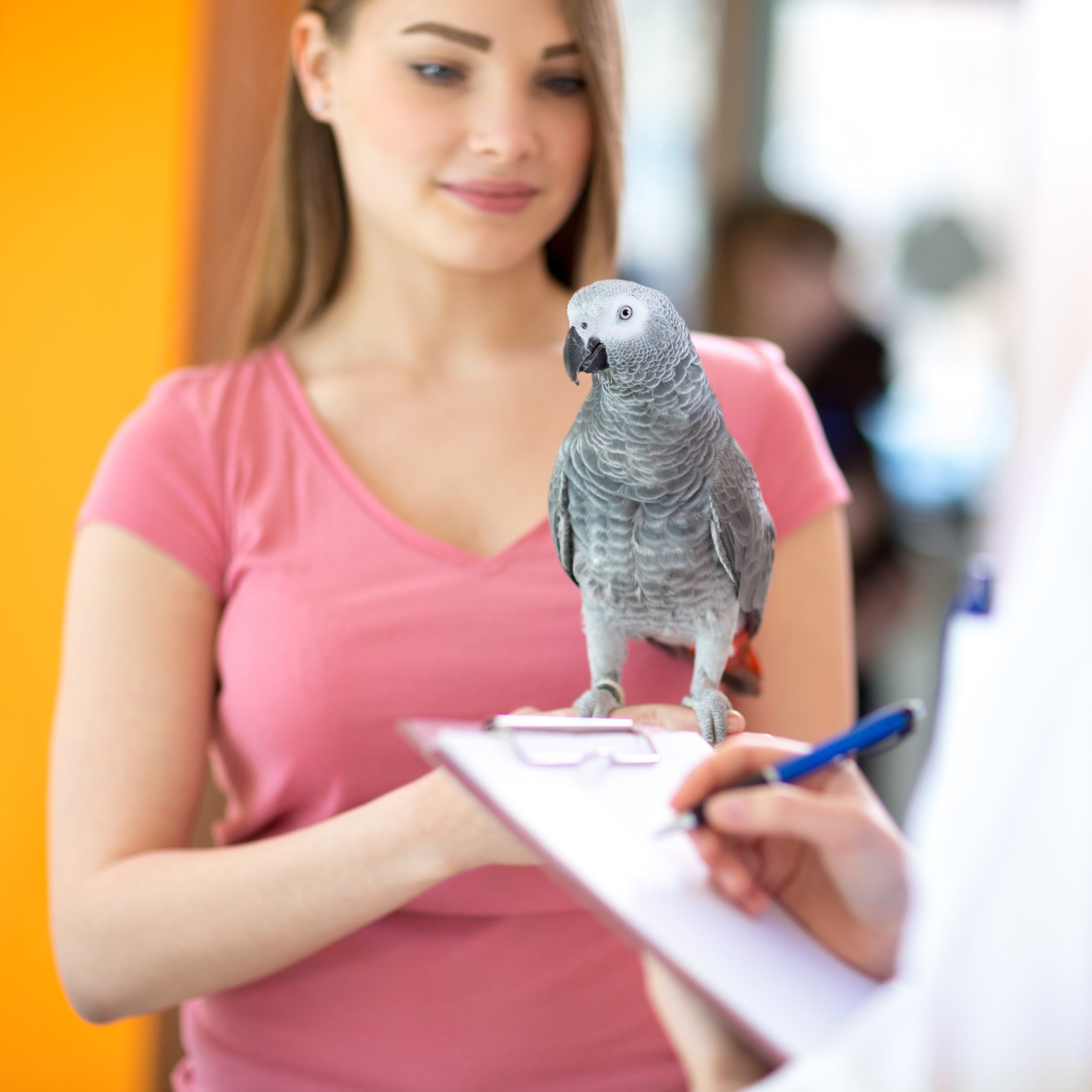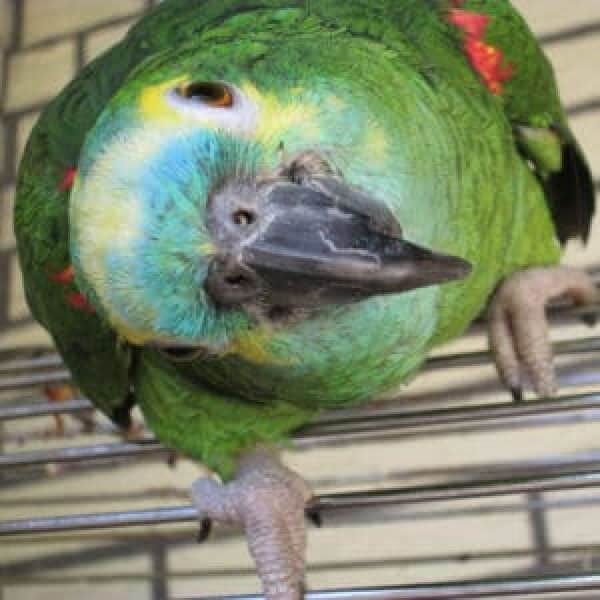Last Updated on by Mitch Rezman
Parrots are delicate creatures that often hide signs of illness until they become seriously ill.
As a pet owner, it’s vital to be vigilant and informed about common health issues that might affect your pet bird.
By recognizing the early signs of illness and knowing when to visit an avian vet, you can help ensure a long, happy, and healthy life for your parrot.
Recognizing Signs of Illness in Parrots
Parrots can be masters at hiding discomfort or sickness, a natural instinct to protect themselves from predators. However, several telltale signs can indicate something is wrong:
Behavioral Changes: Lethargy, reduced vocalization, loss of interest in playing, or uncharacteristic aggression can all indicate health issues.
Physical Signs: Changes in feather condition (e.g., ruffled, dull, or broken feathers), sitting at the bottom of the cage, changes in breathing (wheezing, tail bobbing), or a drooping posture are red flags.
Droppings and Appetite: Sudden changes in the color, consistency, or frequency of droppings can signify illness. Additionally, loss of appetite or difficulty eating can point to digestive or beak-related issues.
Common Ailments in Parrots
Understanding common health problems in parrots can help you spot the warning signs early. Here’s a closer look at some frequent ailments that pet parrots may face:
Feather Plucking and Self-Mutilation
Feather plucking is a behavior where a parrot pulls out its feathers, sometimes even harming its skin (self-mutilation). This can stem from several causes:
Causes: Stress, boredom, nutritional deficiencies, skin infections, hormonal imbalances, or underlying medical conditions.
Symptoms: Excessive grooming, broken or missing feathers, and visible patches of bare skin.
Treatment: Consult an avian vet to identify the root cause. Environmental enrichment, dietary changes, or medical treatment may be necessary.
Respiratory Infections
Parrots are prone to respiratory infections, often caused by bacteria, fungi (like Aspergillus), or environmental factors such as poor air quality.
Signs: Sneezing, nasal discharge, coughing, wheezing, open-mouthed breathing, tail bobbing, and changes in vocalizations.
Importance of Early Detection: If left untreated, respiratory infections can become severe and potentially life-threatening. Immediate veterinary attention is essential for diagnosis and treatment.
Digestive Issues in Parrots
Digestive problems can manifest in various forms, including diarrhea, constipation, or undigested food in droppings.
Possible Causes: Poor diet, bacterial or viral infections, parasites, or ingestion of toxic substances.
When to Seek Veterinary Care: If changes in droppings persist for more than a day or are accompanied by other symptoms like lethargy, consult your vet.
Beak and Feather Disease
Psittacine Beak and Feather Disease (PBFD) is a viral infection affecting a bird’s feathers, beak, and immune system.
Symptoms: Abnormal feather growth, feather loss, beak deformities, and secondary infections due to a weakened immune system.
Management: No cure exists for PBFD, but supportive care and a strong emphasis on hygiene can help manage the condition.
Beak Overgrowth and Abnormalities
Parrots’ beaks naturally wear down through regular chewing and eating, but sometimes they can grow excessively.
Causes: Nutritional imbalances, genetic factors, or a lack of appropriate chewing materials.
Signs: Overgrown, cracked, or misshapen beak.
Treatment: Provide a variety of chew toys, natural perches, and consult your vet for regular beak trims if needed.
Parasitic Infections
External parasites like mites can cause skin irritation, while internal parasites (worms) can lead to digestive issues.
Signs: Excessive scratching, feather damage, changes in droppings, weight loss.
Treatment and Prevention: Regular vet check-ups, maintaining a clean cage, and using parasite control measures when necessary.
Routine Health Checks at Home
Regular health checks at home can help you catch potential issues early. Here’s what to include in your routine:
Daily Visual Inspection: Check your parrot’s eyes (clear, bright), beak (smooth, normal growth), feathers (clean, no excessive plucking), and feet (free from sores or swelling).
Weekly Physical Checks: Weigh your parrot regularly to monitor for sudden weight loss or gain. Note changes in activity levels and droppings.
Dietary Monitoring: Observe eating habits. A sudden change in appetite or difficulty eating could indicate health issues.
The Importance of Regular Vet Check-Ups
Even if your parrot appears healthy, annual vet visits are crucial. A thorough wellness exam includes a physical check, weight measurement, and sometimes blood work or fecal analysis to detect hidden health problems.
Preventive Care: Regular check-ups can help identify and address potential health issues before they become severe. This is particularly important for older parrots, who may be more prone to certain health conditions.
When to Seek Emergency Care
Certain symptoms require immediate veterinary attention:
- Difficulty breathing (open-mouthed breathing, heavy panting)
- Uncontrollable bleeding
- Seizures or loss of balance
- Persistent vomiting or diarrhea
- Sudden changes in behavior (e.g., extreme lethargy)
In such cases, contact an avian vet immediately and follow any emergency care instructions while preparing to transport your parrot.
Do you have a number for an emergency veterinarian?
Conclusion
Being proactive about your parrot’s health involves understanding common illnesses, recognizing early signs of trouble, and maintaining a regular health check routine.
Regular vet visits, combined with daily and weekly at-home checks, will help keep your feathered friend in peak condition. By staying informed and prepared, you can ensure that your parrot lives a long, happy, and healthy life.
FAQs
- How often should I take my parrot to the vet?
Ideally, you should take your parrot for an annual wellness check. Older birds or those with existing health conditions may need more frequent visits.
- What should I do if my parrot stops eating?
If your parrot refuses food for more than 24 hours, consult an avian vet immediately, as this can indicate a serious health issue.
- Can parrots hide their illnesses?
Yes, parrots often hide signs of illness as a survival instinct. This makes it crucial to monitor their behavior, appearance, and droppings closely.
- Is feather plucking always a sign of illness?
Not necessarily. While it can indicate health issues, it may also be caused by stress, boredom, or environmental factors. A vet visit is essential to determine the root cause.
- How can I prevent respiratory infections in my parrot?
Maintain good cage hygiene, avoid drafts, use air purifiers if needed, and provide a balanced diet to keep your parrot’s immune system strong.
Author Profile
Latest entries
 Feeding Exotic BirdsDecember 29, 2025How to Switch or Convert Your Bird From Seeds to Pellets: Real-Life Case Studies and Practical Guidance
Feeding Exotic BirdsDecember 29, 2025How to Switch or Convert Your Bird From Seeds to Pellets: Real-Life Case Studies and Practical Guidance Feeding Exotic BirdsDecember 16, 2025A Practical, Budget-Smart Guide to Feeding Birds Well
Feeding Exotic BirdsDecember 16, 2025A Practical, Budget-Smart Guide to Feeding Birds Well Bird EnviornmentsDecember 7, 2025Understanding Budgie Cage Bar Orientation: Myths, Realities & Practical Solutions for Vertical-Bar Bird Cages
Bird EnviornmentsDecember 7, 2025Understanding Budgie Cage Bar Orientation: Myths, Realities & Practical Solutions for Vertical-Bar Bird Cages Feeding Exotic BirdsDecember 5, 2025How Dr. T.J. Lafeber Rewrote the Future of Pet Bird Nutrition
Feeding Exotic BirdsDecember 5, 2025How Dr. T.J. Lafeber Rewrote the Future of Pet Bird Nutrition



